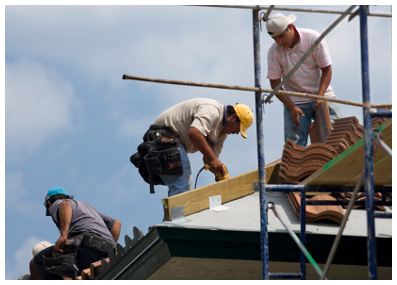 Following the June passing of Alabama’s new illegal immigration law, HB56, many Hispanics have left the state to seek work elsewhere, causing a potential shortage of construction workers needed for rebuilding areas destroyed by the April tornados, according to an article by staff writer Patrick Rupinski in The Tuscaloosa News last week. The article tells how a worker in the Hispanic ministry at a local Catholic church called to check up on a man she had not seen lately and that he told her that he had moved to Texas, like many other Hispanics who are now leaving Alabama. Rupinski writes:
Following the June passing of Alabama’s new illegal immigration law, HB56, many Hispanics have left the state to seek work elsewhere, causing a potential shortage of construction workers needed for rebuilding areas destroyed by the April tornados, according to an article by staff writer Patrick Rupinski in The Tuscaloosa News last week. The article tells how a worker in the Hispanic ministry at a local Catholic church called to check up on a man she had not seen lately and that he told her that he had moved to Texas, like many other Hispanics who are now leaving Alabama. Rupinski writes:
“Some Hispanics left after the April 27 tornado rendered them homeless. But a potentially larger exodus of Hispanics began after the Alabama Legislature passed a law in June that bans hiring people who are in the country illegally.”
Set to go into effect on September 1, the law will require that employers register by April 1, 2012 and then use the federal program E-Verify to determine all workers’ eligibility to work in the United States. In order to work on government projects, employers must begin using the system by January 1, 2012. Employers will face escalating penalties for each violation and may lose their business licenses permanently after 3 offences. Other potential penalties for employers include having to pay 10 times the deduction taken as a business expense for wages paid to a worker found to be illegal.
Jimmy Latham, CEO of WAR Construction in Tuscaloosa and president of the Alabama Association of General Contractors (AGC) is quoted as saying:
“Statewide, what we think will happen is that the (work) crew sizes will get smaller and prices will go up.”
Latham explained that the workforce shortage would result in projects taking longer to complete, especially next year when the law takes effect. He said that the Alabama construction industry was already facing a labor shortage even before this law was passed, and for this reason, the AGC has been advertising to attract new workers to begin careers in construction, as well as partnering with the Alabama Construction Recruitment Institute on their Go Build Alabama initiative which we told you about last March.
Other Alabama industries also will likely suffer labor shortages. There may not be as many crop harvesters and workers for processing plants for catfish and poultry, as “jobs in those industries often are not taken by Americans”, according to Michael Innis-Jimenez, an assistant professor of American studies at the University of Alabama, who specializes in Latino and labor issues. The article offers these additional statements from Innis-Jimenez:
"In Alabama, the feeling I have is that anybody with ties to other states will go there if work is available. When people live in fear of getting fired or deported, they will just go somewhere else to work. ...We don't have a national ID. Rather than police proving you are an undocumented immigrant, you will have to have someone prove you are here legally.”
This is one reason that Latham said that the Alabama Association of General Contractors has taken the position that any immigration reform laws should be done at the national level to put all states on equal footing.
This issue will certainly continue to be debated in Alabama as well as in other states. In the meantime, contractors in Tuscaloosa will continue to prepare for the new law and to do their best to develop the workforce they will need in the not-too-distant future.



Add new comment